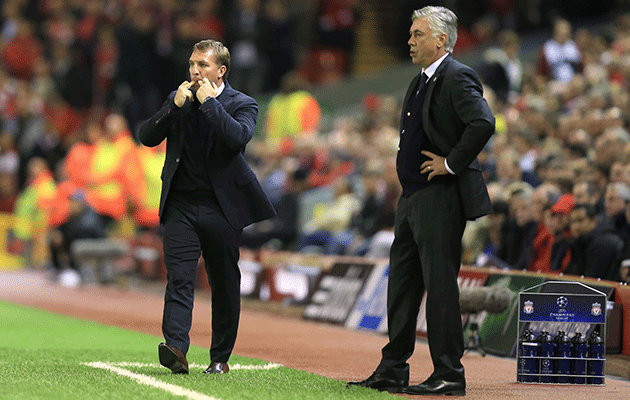Brendan Rodgers has called for more assistance from England’s football authorities to help Premier League clubs flourish in Europe.
The prospect of the Premier League losing its fourth Champions League qualifying place – though still slim – has increased after another dismal evening in the Champions League. Following defeats on Tuesday for Arsenal at home to Olympiakos and Chelsea away at Porto, the four Premier League teams have lost five of their six Champions League group games so far this season.
Rodgers cited Porto’s preparations for their match against Chelsea as an example of how English football could help its representatives in Europe.
Porto’s league game at Moreirense was played on Friday to allow more time for the players to prepare for Chelsea’s visit, and the Portuguese team will not play again until Sunday’s home game with Belenenses. Chelsea, by contrast, travelled to Newcastle last Saturday and host Southampton this Saturday.
“You see Porto last night,” said Rodgers. “Porto played on Friday, they had dispensation to move their game, so that keeps them fresh. I also think the big teams abroad can sometimes win games at 70% and conserve their energy and be fresh. There is no game in the Premier League where you can do that.
“Chelsea will come back and have a tough game at Southampton this weekend,” he added. “There is no easy game in the Premier League”
Although, as this was the same Southampton side that was knocked out of the Europa League by Midtjylland of Denmark, one wonders how competitive the Danish league might be.
The Liverpool manager believes the Premier League and Football Association could do more to help English teams in European competition.
“I think they could do more to support the teams in Europe,” he added. “It happens with the other federations and in other countries. They help. That doesn’t happen in this country. As I said, the physicality of this league and the demand on players is like no other.
“In other countries, some of the big teams can change five, six, seven players and still win the game and field a real strong team for the next game. They have got a domestic competition less too. We have two cup competitions in this country, the others have one. It all adds up to it being difficult for the Premier League teams.”
Although, it should be noted, this busy schedule proved not to be an impediment to English clubs when they were dominating the Champions League a few years back.
If a problem does exist for English clubs – and it is too early to draw definitive conclusions – surely the hurly burly nature of the Premier League clubs needs to be kooked at. Primitively entertianing it may be, but is it really the ideal preparation for the more subtle, tactical and technical based football to be found on the European mainland?







